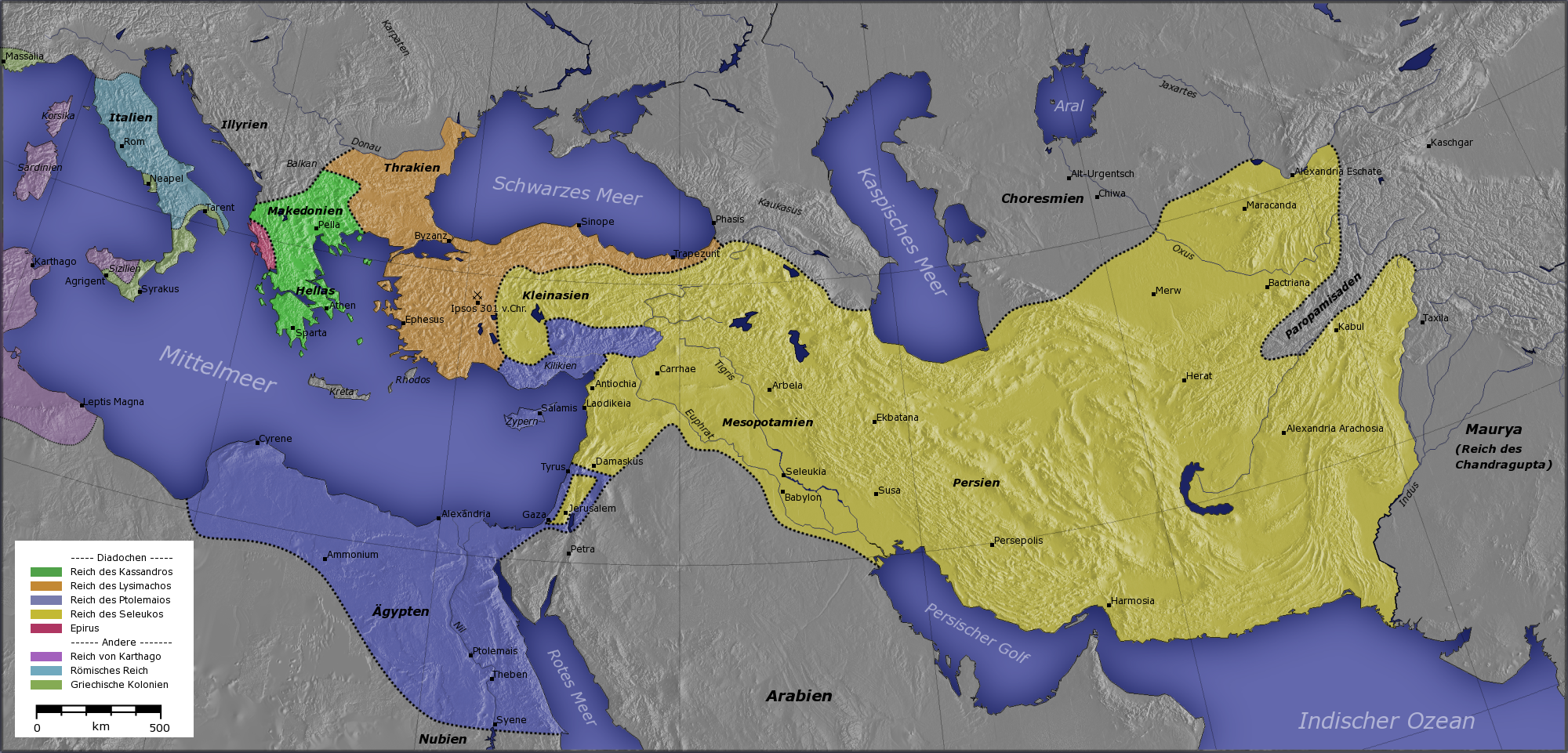- Cassander
thumb|right|float|300px
Otherdiadochi Other]Cassander (Greek: "Κάσσανδρος", "Kassandros"; ca. 350 - 297 BC), King of
Macedon (305 - 297 BC), was a son ofAntipater , and founder of the short-livedAntipatrid dynasty .Early history
Cassander is first recorded as arriving at Alexander the Great’s court in
Babylon in 323 BC, where he had been sent by his father, Antipater, likely to help uphold Antipater’s regency in Macedonia, although a later contemporary suggestion hostile to the Antipatrids was that Cassander had journeyed to poison the King.Fox, Robin Lane. "Alexander the Great". p469, 2004 Ed.]Whatever the truth of this suggestion, Cassander certainly proved to be singularly noted amongst the
diadochi in his hostility to Alexander‘s memory. Alexander IV, Roxanne, and Alexander’s supposed illegitimate son Heracles would all be executed on his orders, and a guarantee toOlympias to spare her life was not respected. [Green, Peter. "Alexander the Great and the Hellenistic Age". p38, 2007 Ed.] So too, Cassander would restore Thebes, which had been destroyed under Alexander. This gesture was perceived at the time to be a snub to the deceased King. [Green, Peter. "Alexander the Great and the Hellenistic Age". p40-41, 2007 Ed.] It was even said that he could not pass a statue of Alexander without feeling faint. Cassander has been perceived to be ambitious and unscrupulous, and even members of his own family were estranged from him. [Fox, Robin Lane. "Alexander the Great", p475, 2004 Ed.]Later history
As Antipater grew close to death in 319 BC, he transferred the regency of Macedon not to Cassander, but to
Polyperchon , possibly so as not to alarm the other diadochi through an apparent move towards dynastic ambition, but perhaps also because of Cassander’s own ambitions. [Green, Peter. "Alexander the Great and the Hellenistic Age". p35-36, 2007 Ed.] Cassander rejected his father’s decision, and immediately went to court Antigonus, Ptolemy andLysimachus as allies. Waging war on Polyperchon, Cassander would destroy his fleet, put Athens under the control ofDemetrius of Phaleron , and declare himself Regent in 317 BC. After Olympias’ successful move against Philip III later in the year, Cassander would besiege her inPydna . When the city fell two years later, Olympias was killed, and Cassander would have Alexander IV and Roxanne confined atAmphipolis .Cassander associated himself with the
Argead dynasty by marrying Alexander’s half-sister, Thessalonica, and had Alexander IV and Roxanne executed in either 310 BC or the following year. Certainly, in 309, Polyperchon would begin forwarding the claims of Heracles as the true heir to the Macedonian inheritance, at which point Cassander bribed him to have the boy killed. [Green, Peter. "Alexander the Great and the Hellenistic Age". p44, 2007 Ed.] After this, Cassander’s position in Greece and Macedonia was reasonably secure, and he would proclaim himself King in 305 BC. [Green, Peter. "Alexander the Great and the Hellenistic Age". p163, 2007 Ed.] After theBattle of Ipsus in 301 BC, in which Antigonus was killed, he was undisputed in his control of Macedonia. However, he had little time to savour the fact, dying ofdropsy in 297 BC.Cassander’s dynasty did not live much beyond his death, with his son Philip dying of natural causes, and his other sons Alexander and Antipater becoming involved in a destructive dynastic struggle along with their mother. When Alexander was ousted as joint king by his brother, Demetrius I took up Alexander's appeal for aid and ousted Antipater, killed Alexander, and established the
Antigonid dynasty . The remaining Antipatrids such asAntipater Etesias would prove unable to re-establish the Antipatrids on the throne.Of more lasting significance was Cassander’s transformation of
Therma into Thessalonica, naming the city after his wife. Cassander also foundedCassandreia upon the ruins ofPotidaea .Cassander as a fictional character
*
Mary Renault refers to Cassander in the Alexander Trilogy by his Greek name, Kassandros, and depicts him highly negatively. In "Funeral Games ", he is the villain of the piece.
* In theOliver Stone film "Alexander", he is portrayed byJonathan Rhys Meyers .Notes
References
*
Diodorus Siculus , "Bibliotheca" chapters xviii, xix, xx
*Plutarch , "Parallel Lives ", "Demetrius", 18, 31; "Phocion ", 31
*Franca Landucci Gattinoni: L'arte del potere. Vita e opere di Cassandro di Macedonia. Stuttgart 2003. ISBN 3-515-08381-2External links
* [http://freepages.genealogy.rootsweb.com/~jamesdow/s016/f020716.htm A genealogical tree of Cassander]
Wikimedia Foundation. 2010.

